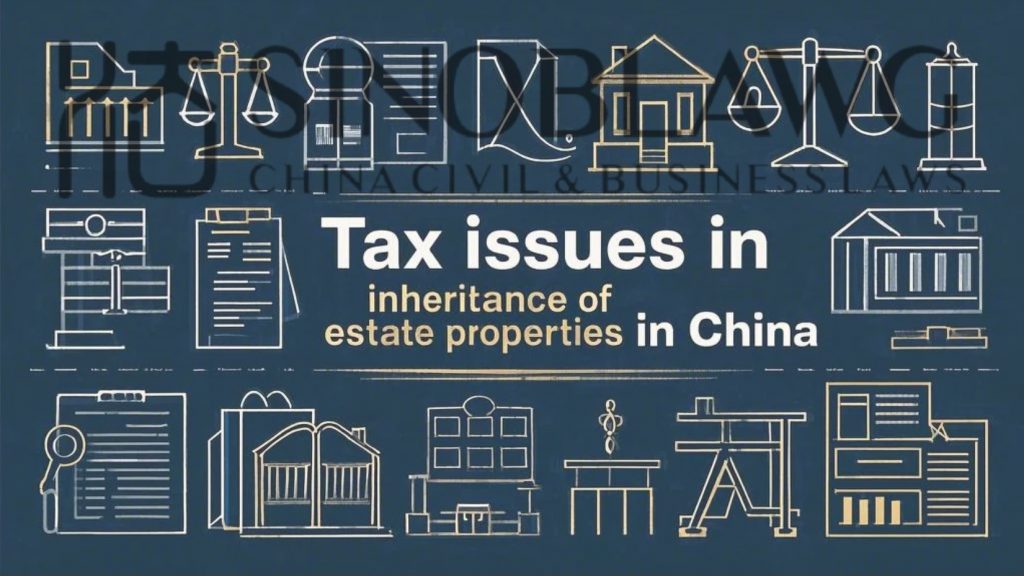We have written a lot of posts related to inheritance of real estate (real properties) in China. Frequently, we get inquiries about and deal with inheritance of personal properties such as stock/equity interests in a company or bank deposits/cash in China.
It is worth a separate post because the rules regarding inheritance of personal properties are quite different from those regarding real estate.
In this post, we focus on bank deposits, prompted by a recent inquiry.

Before you read further, you may wish to get a general understanding on how inheritance of estates is carried out in China. A couple of old posts for your reference:
Three Ways of Inheriting Estates in China
China Estate Planning I: How to deal with your China assets generally
Inheritance of Personal Properties/Chattels in China: a Real Headache
I. Intestate Inheritance of Cash Money
It is always easier to explain legal issues by illustration. So let us create a hypothetical case here.
(1) Facts of the Case
Tom, an American citizen, died recently in a city in USA where he had habitually resided there for the last a couple of years. Not long before he died, Tom just sold a property in Shanghai China and had a handsome amount of RMB in his bank account in Shanghai. Tom didn’t have a will in place. Now his son David, and his daughter Mary, also both American citizens residing in USA, want to claim the estate money and take the money home to USA.
(2) Legal Problems
As a matter of law and practice, banks require David and Mary to obtain a notarization document -inheritance right notarization- that affirms their right to inherit the cash estate. Without the notarization document, banks won’t be sure which claimants are the rightful heirs or beneficiaries to the estate.
Here come the problems.
(i) Jurisdiction of Notary Offices
China Law on Notarization provides in its Article 25 that:
A natural person, legal person or other organizations may apply to a notary office for notarization at the place of its domicile or habitual residence, or the place of actions or happening of facts.
In our case of inheritance of the cash estate, it is hard for any notary office to find jurisdiction over the matter based on those “places” provided in the Article.
With the enactment of China Law on Notarization in 2006, notary offices are deregulated a lot in that any notary office in a city (pls note that a “city” in China is a lot larger than one in USA, Canada or Australia) can handle a notarization matter throughout the whole city.
When we asked notary offices about whether they will have jurisdiction over the matter, they are not sure, but said that they cannot handle such a case because of the applicable law issue.
(ii) Applicable Law in Notarization
None of those notary offices would handle such an inheritance matter on the ground that as Chinese notary office, they can only work on a matter in which the applicable law is Chinese law.
Now in our hypo case, what is the applicable law?
Article of China Law on Choice of Law to Foreign-related Civil Relations reads:
The laws of the place of the habitual residence at the time of death of the deceased shall apply in intestate inheritances, but the laws of the locality of the real estate shall apply in the intestate inheritance of a real estate.
Applicable Laws in Intestate Inheritances of Estates in China.
Since Tom’s habitual residence is in USA, and bank deposits are not real estate, the applicable law governing the inheritance of the bank deposits will be the relevant laws in the state where Tom died, anyway, let us call it American law. So regarding how the estate bank deposits shall be divided and dispersed between David and Mary, China notary office shall have to apply American laws. But they don’t know any American laws.
Back in May of 1985 immediately after the enactment of China Succession Law, China Ministry of Justice, the authority overseeing China notary offices, gave a reply to question raised by a provincial counterpart, in which the CMJ laid down the basic principle to the effect that it is not appropriate for China notary offices to directly issue inheritance right notarization in cases where foreign laws are the applicable laws. To date, this reply is still valid according to the database of China laws.
(3) the Way Out of Dilemma
In practice, our experience of working with different notary offices in Shanghai, Beijing, Shenzhen or Guangzhou has told us that many notary offices won’t entertain such an inheritance case in which foreign laws shall be applied. However, we do find some notary offices that are willing to do such notarizations, so don’t hang up with one notary office, try different ones.
In case David and Mary won’t be able to obtain the bank-required notarization document to affirm their entitlement to the estate. The only way for them to proceed to get the job done is to resort to China court for a solution. In other words, one of them shall file a case against the other to “make” a case pretending that they have dispute over the estate. China court will then apply American law and deliver a judgement allocating the estate between David and Mary accordingly. With the court judgment, the siblings will finally get the money inherited and repatriated back to USA.
II. Testate Inheritance of Cash Money
In the above discussion, we address the intestate inheritance of the cash estate. We shall examine the case of testate inheritance as well where there is a will/testament involved.
(i) Facts of the Case
We just alter the facts in the hypo case above by adding that Tom had made a will before he died in which David and Mary are the beneficiaries.
(2) Legal Problems
As a general rule regarding inheritance, when there is a valid will, the estate shall be dealt with and dispersed according to what the Will says.
When there is a will, then the prerequisite issue is to decide on whether the will is valid or not. But what laws shall be applied to make this decision? Again, we turn to China Law on Choice of Laws. Article 33:
Article 33 With regard to validity of a will /testament, the law of the place of habitual residence or the law of the state of nationality at the time of making testament or of death of the testator shall apply.
Applicable Law on Validity of Wills.
In the hypo case in question, since Tom had his habitual residence in USA at the time of either his making of the will or his death, the law applicable for deciding on validity of his will shall be American law.
Then the same legal problem arises as in the case of intestate inheritance of the cash estate. Many China notary offices will not entertain a case of this kind in which foreign laws need to be applied. Again, you need to approach and inquire different notary offices to try your luck.
Without the notarization document issued, the bank will not release the cash to anyone. David and his sister Mary shall have to “make” a lawsuit between them to get a court judgement affirming their entitlement to the cash and their shares therein.
III. Further Roadblock in Inheriting Cash in China
The problems for foreigners in inheriting cash money (including most of other personal or movable properties) don’t just end above. There could be another one in the way.
In our hypo case, the money left by Tom is clearly indicated to be from the sale of the property Tom owned before he died. When David and Mary manage to get the inheritance done and ready to use the RMB money to purchase foreign exchange (say USD), it is easy for them to prove the legitimate source of the income and the clearance of taxes thereon.
What if the cash has been in the bank account for some years and it is hard for the heirs to trace the legitimate source and prove payment of taxes?
Back in 2004, China Central Bank issued the regulation entitled “Provisional Measures on Administration of Sale and Payment of Foreign Exchange in Respect of Displacing Personal Assets Overseas“. Under this Regulation, inheritance by foreigners (including people from Hong Kong, Macau and Taiwan) of properties within China and ensuing purchase and repatriation of foreign exchange are specifically addressed.
According to the Regulation, foreign recipients of estates in China shall apply to China State Administration of Foreign Exchange (SAFE) for approval for purchase and repatriation of foreign exchanges. Part of the documents required thereby are proofs proving the deceased’s legitimate source or title to the estates and that the correspondent taxes have been paid thereof.
However, the wording in the Regulation and its auxiliary rules (SAFE guidelines on this issued in 2017) seem to cover only estates left by Chinese citizens (but inherited by foreigners), not estates left by foreigners. Indeed, our inquiry to SAFE authority elicited and confirmed that they won’t entertain application for approval on inheritance of estates left by foreigners in China. Foreign recipients may directly apply to banks for purchasing and repatriating foreign exchanges out of China.
On the other hand, when there is money flowing out of China, it is still necessary, as confirmed by SAFE, that the documents proving legitimacy and taxation will be required.
As we can imagine, in some cases, foreign estate recipients may have difficulty in producing such documents, which could be a real headache. If foreigners inherit the cash and cannot move the money out of China, then what is the point of bothering the estates at all?




Comments